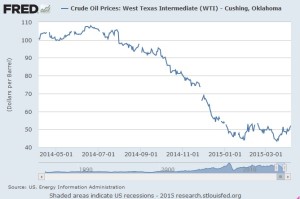Just how much of an impact has the tumbling price of oil had on the global labor market? According to a new report published in the Wall Street Journal, it’s had a major effect on jobs in the United States and around the world.
Due to falling oil prices and fluctuations in the supply and demand in the energy industry, 100,000 jobs have been lost worldwide, including 12,000 jobs in the U.S., since late 2014. The ones to be hit hardest have been specialists, support workers and hard-manual labor employees working on oil rigs.
Indeed, the job cuts have seeped into many sectors of the oil industry, like drilling companies and equipment manufacturers. In total, there are currently more than 300,000 workers earning a paycheck in this field, but it continues to dip because of the daily layoffs that occur from coast to coast.
Tim Cook of PathFinder Staffing put it this way: “The closer your job is to the actual oil well, the more in jeopardy you are of losing that job.” He added: “Each time an oil rig gets shut down, all the jobs at the work site are gone. They disappear.”
Ostensibly, the total number of oil and gas rigs in the U.S. is at its lowest since 2010, while shale fracking, which was a key driver of the domestic oil boom, has now become a less profitable industry to invest in because of the enormous supply. It should be noted, however, that joblessness in this industry is still less than the national average.
Many of the unskilled and uneducated have been able to earn a lucrative living from the booming oil industry. They may now be forced to work in construction, but that means their pay would be cut in half (on average). The problem in this scenario, too, is the fact that construction spending has been falling in recent months.
The Organization for Petroleum Exporting Countries (OPEC) still hasn’t reduced its supply because leaders are betting that the market will soon stabilize in the coming months and continue the upward trend. Also, OPEC recently chastized competition within the oil industry as the reason for the immense number of lost jobs.
“Yet, when it comes to the supply of petroleum, there is a stubborn willingness of some non-OPEC producers to adopt a go-it-alone attitude, with scant regard for the consequences,” the group’s leaders wrote in the Mar. 2015 edition of the OPEC Bulletin Commentary. “These parties consider producing to the maximum as being the norm. To them, rationalizing the development of one’s precious natural resources in keeping with market demands appears to be an alien concept.”
Douglas A. McIntyre opined in 24/7 Wall Street: “Advances in technology in many industries radically change those industries, which often costs jobs. In the case of oil prices, there are also benefits to consumers. It is not the job of suppliers to weigh these factors as they act to improve their own profits and future prospects.
“OPEC’s assumption is that new supply from Canada and the United States should be throttled back. The argument is self-serving.”
Who knows what the future has in store? Crude oil prices are gradually increasing. The price of a barrel of oil is trading at around $60, which is about half of what it was trading in Jun. 2014.

Leave a Comment